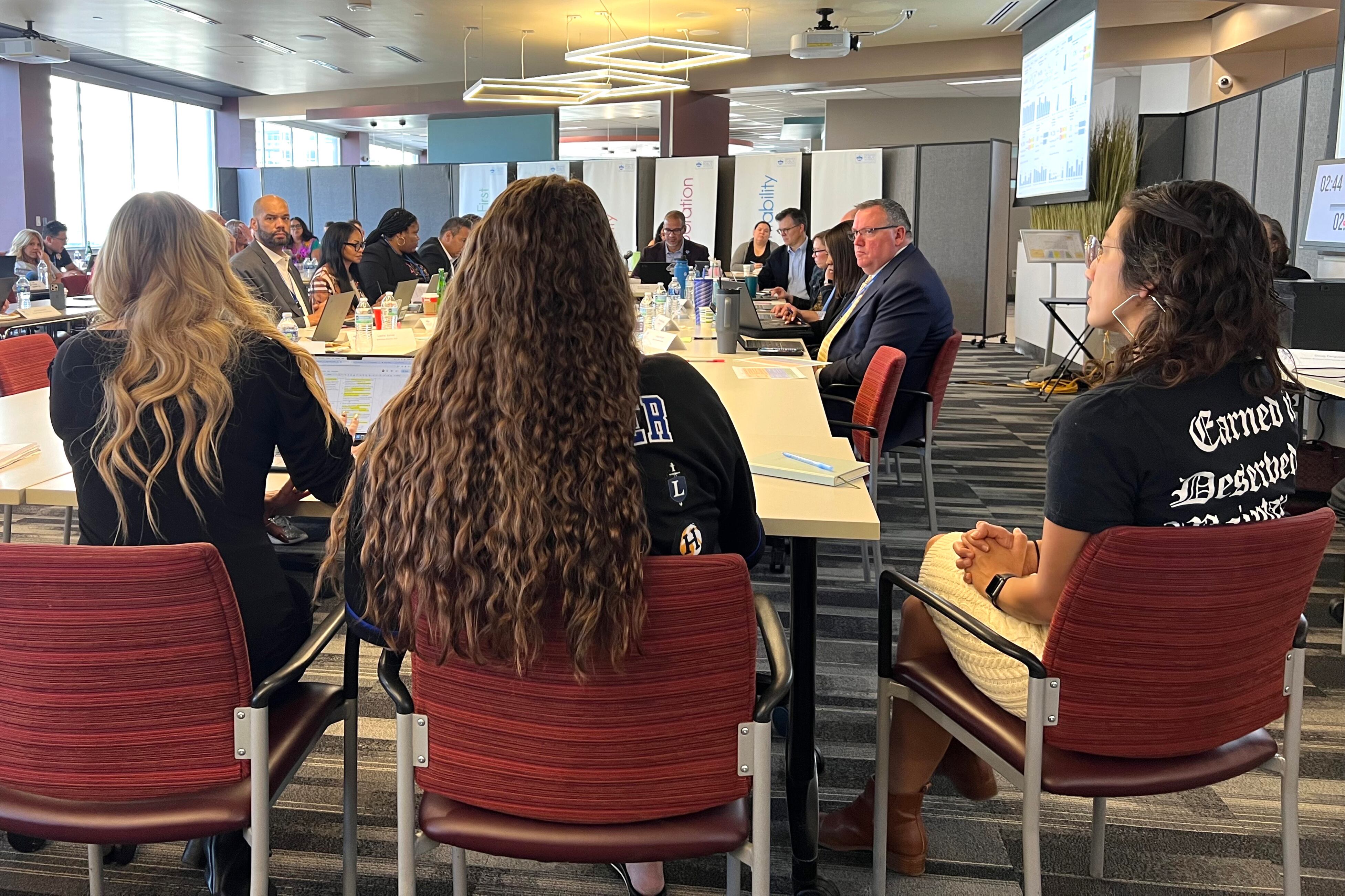Sign up for Chalkbeat Colorado’s free daily newsletter to get the latest reporting from us, plus curated news from other Colorado outlets, delivered to your inbox.
Denver Public Schools Superintendent Alex Marrero’s cabinet gathered on a recent Friday on the top floor of district headquarters.
Marrero and his top deputies sat at one end of a rectangle of tables. Cabinet members sat along the sides. At the other end was a succession of school principals, who sat at the table for about 15 minutes each with their supervisors and a microphone.
Data from one principal’s school — like test scores and attendance numbers — was projected on a big screen. The principal had five minutes to talk about the data. The cabinet members had four minutes to ask questions. Then the principal had two minutes to make a specific request for support. Representatives from every department of the district’s central office were in the room.
When a principal said her school was having trouble with online tests erasing students’ answers, Deputy Superintendent of Schools Tony Smith motioned toward a member of the district’s technology team and introduced him to the principal as “the tech guru.”
DPS calls this rapid-fire back-and-forth the Data MINE. It’s part accountability hearing and part help desk. MINE stands for Monitoring Improvement, Navigating Excellence. It began last school year and is one of the district’s new strategies for improving school performance. The approach also represents a shift in district philosophy.
Whereas previous superintendents believed that giving schools autonomy would lead to academic success, Marrero said he believes autonomy should be earned through high performance — and that struggling schools need centralized district oversight and assistance.
“Autonomy, autonomy, autonomy, without accountability, what you have is anarchy,” Marrero said in an interview. “Are we a school district or a district of schools? Everybody might want autonomy, but what happens when you fail repeatedly?”
The Data MINE is exclusively for DPS schools on the state accountability clock, a term for the system that ticks down toward state intervention if schools’ standardized test scores, graduation rates, and other measures don’t improve. About 30 of Denver’s approximately 150 district-run schools are on the clock this year, according to preliminary state data.
Other school districts across the country have processes similar to the Data MINE, and Marrero credited those districts with inspiring him. But he said Denver’s process is slightly different.
“I Marrero-fy it,” he said.
DPS connects principals to school district’s knowledge, resources
The Data MINE happens four times a year. The most recent one, in late September, was a two-day affair. Marrero started day two with a pep talk.
He said that while some people might see Denver students, two-thirds of whom are from low-income families and nearly a third of whom are English learners, as not good enough, “we can do better than you expected and better than most.”
“Look at the amount of knowledge, power, and also resources we have in this space — and that’s devoted to you all,” Marrero told the principals who would be in the hot seat that day.
He pointed out that 17 of the 23 schools that participated in the Data MINE last year earned more points this year on their state rating, which is largely based on test scores and is what the state considers when deciding which schools to put on the accountability clock.
One key rule of the Data MINE is that after school principals ask for support, a representative from the district’s central office must start helping within 48 hours.
“There’s always been this perception of a divide between central office and schools,” said Joe Amundsen, the district’s executive director of school transformation. “It’s trying to break that down. We approach it as, ‘We are all in this.’”
Nestor Bravo, who recently became principal of Abraham Lincoln High School, said it can sometimes be a “reality check” to realize that the district can’t always provide what schools need most: more money and more staff. But he said it’s still helpful to have a central office staff member come to the school to troubleshoot issues on the ground.
“Every time we shared the needs we have, they immediately respond,” said Bravo, who previously participated in the Data MINE as principal of Charles M. Schenck Community School, a dual language elementary school that was on the clock but isn’t any longer.
Chris DeRemer, the principal of Manual High School, has been to the Data MINE several times. At first, he said he was hesitant.
“I felt like, ‘What are they going to ask? What level of pressure am I going to feel publicly, and is that the point?’” DeRemer said.
But he said he learned that’s not what the Data MINE is about.
“As the principal, it allows me to network with other principals and people from DPS right there, and meet people that I’ve met via email but never in person who can help solve problems,” DeRemer said.
At the Data MINE in late September, DeRemer talked about how Manual had raised its daily attendance rate and how most students made above-average progress on state math tests but scores for students with disabilities were still unacceptably low.
When it came time for cabinet members to ask questions, Chief of Academics Simone Wright asked about Manual’s ninth graders.
“I believe roughly 27% of the Class of 2028 is currently failing a class and you all are about to wrap up your first quarter,” she said. “What’s the plan?”
“Yeah, the plan is conferences on Monday with just ninth grade,” DeRemer said, before listing other strategies the school planned to use to improve that statistic.
Despite some ninth graders’ struggles, that meeting was actually DeRemer’s last Data MINE session. That’s because he recently learned that Manual High showed enough improvement this year to exit the state accountability clock.
DeRemer said he’ll actually miss the MINE.
Melanie Asmar is the bureau chief for Chalkbeat Colorado. Contact Melanie at masmar@chalkbeat.org .






